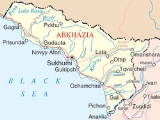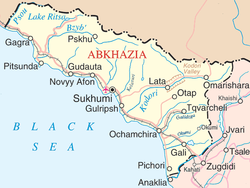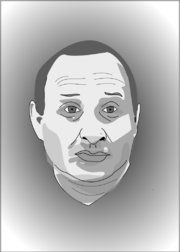
2006 Kodori crisis
Encyclopedia
The 2006 Kodori crisis erupted in late July 2006 in Abkhazia
's Kodori Gorge, when a local militia leader declared his opposition to the Government of Georgia, which sent police forces to disarm the rebels. The upper part of the Kodori Gorge was at that time the only portion of Abkhazia, Georgia's breakaway republic, not controlled by the Abkhaz authorities.
 The Kodori Gorge, with its forested landscapes and rocky hills, lies in the Greater Caucasus
The Kodori Gorge, with its forested landscapes and rocky hills, lies in the Greater Caucasus
mountains, in the northeastern corner of Abkhazia. In spite of several Abkhaz attempts to gain hold of this strategic gorge inhabited by the Svans, a local subgroup of the Georgian people
, the upper part of the gorge has never been under the control of the secessionists since the Abkhazian war
. It has remained under precarious control of the central Georgian government, but the government of the area has effectively been run, until the recent crisis, by a local authority and warlord Emzar Kvitsiani
, who previously led the defense of the gorge against the Abkhaz separatist forces in the capacity of the commander of the local Monadire (literally: "Hunter") militia force and an envoy of the former President of Georgia
named Eduard Shevardnadze
. After the ouster of Shevardnadze in the bloodless Rose Revolution
in 2003, the new Georgian government disbanded the Monadire force and abolished Kvitsiani's post. There have also been strong suspicions about Kvitsiani's involvement in smuggling and other criminal activities like providing shelter to several criminal authorities, wanted by Georgian police.
 The recent crisis started on July 22, 2006, when Kvitsiani rearmed his former militiamen and said, that he defied Georgia’s central authorities and would resist any attempt by the authorities to disarm his militia groups. Attempts to negotiate a surrender went in vain and the militiamen declined an ultimatum sent by the Georgian Interior Minister Vano Merabishvili
The recent crisis started on July 22, 2006, when Kvitsiani rearmed his former militiamen and said, that he defied Georgia’s central authorities and would resist any attempt by the authorities to disarm his militia groups. Attempts to negotiate a surrender went in vain and the militiamen declined an ultimatum sent by the Georgian Interior Minister Vano Merabishvili
. The government of Georgia dispatched, on July 25, a strong detachment of police and security forces to disarm the defiant paramilitary leader. Information coming from the gorge had largely been scarce and unconfirmed as the officials initially refused to make any comment. Later on July 25, Alexandre Lomaia
, the Minister of Education and Science, confirmed, that the planned police operation was underway with the aim to restore constitutional order in the Kodori area. According to a Georgian Rustavi 2
television, the rebels have allegedly been supplied with food and munitions by the Abkhaz military and the Russian peacekeeper forces stationed in Abkhazia. Rustavi 2 also reported, that a helicopter of the Russian peacekeepers landed in the Militia-controlled area to provide rebels with food, but has failed to fly back as the Georgian side threatens to down it.
According to official accounts, governmental forces controlled most of the gorge as of late July 26, forcing the surrender of a number of rebels. Others, including Kvitsiani, hide out in the surrounding forests, several wounded and injured were reported on both sides. The death of a civilian in a shootout between the rebels and police was also confirmed. On July 27, Georgia's Defense Minister, Irakli Okruashvili
, told in his televised interview, that the main phase of the operation had been successfully completed as most of the rebels had been surrendered or captured. He also said, that the revolt "was a provocation planned in a foreign country."
As of late July 28, all villages in the gorge are controlled by the government forces. A huge amount of weapons and munitions have also been discovered in the gorge. Kvitsiani, according to Georgian claims, managed to escape to Sukhumi
, capital of Abkhazia.
, the president of de facto Abkhazian government, made comments on the recent events in the Kodori Gorge and said: "If Georgian soldiers cross the border of Abkhazia, a new conflict may be launched, because Abkhazian soldiers will open fire in that case."
The Georgian authorities deny the accusations, saying, that the only force operating in the gorge are police and security services, that is not a violation of the previous ceasefire accords. They deny the allegations, that the Georgian forces are planning to continue their way into the Secessionist-controlled territories, reiterating, that Georgia plans to resolve the separatist conflicts through peaceful means. On July 26, Jaap de Hoop Scheffer
, Secretary General of NATO
, on his meeting with the Georgian premier, Zurab Noghaideli
, also expressed his support to Georgia's stance to the problems in Abkhazia and its fellow breakaway republic of South Ossetia
.
Abkhazia
Abkhazia is a disputed political entity on the eastern coast of the Black Sea and the south-western flank of the Caucasus.Abkhazia considers itself an independent state, called the Republic of Abkhazia or Apsny...
's Kodori Gorge, when a local militia leader declared his opposition to the Government of Georgia, which sent police forces to disarm the rebels. The upper part of the Kodori Gorge was at that time the only portion of Abkhazia, Georgia's breakaway republic, not controlled by the Abkhaz authorities.
Background

Greater Caucasus
Greater Caucasus , sometimes translated as "Caucasus Major", "Big Caucasus" or "Large Caucasus") is the major mountain range of the Caucasus Mountains....
mountains, in the northeastern corner of Abkhazia. In spite of several Abkhaz attempts to gain hold of this strategic gorge inhabited by the Svans, a local subgroup of the Georgian people
Georgian people
The Georgians are an ethnic group that have originated in Georgia, where they constitute a majority of the population. Large Georgian communities are also present throughout Russia, European Union, United States, and South America....
, the upper part of the gorge has never been under the control of the secessionists since the Abkhazian war
Georgian-Abkhaz conflict
The Georgian–Abkhazian conflict refers to the ethnic conflict between Georgians and Abkhazians in Abkhazia, which is presently a de facto independent partially recognized republic...
. It has remained under precarious control of the central Georgian government, but the government of the area has effectively been run, until the recent crisis, by a local authority and warlord Emzar Kvitsiani
Emzar Kvitsiani
Emzar Kvitsiani was a Georgian presidential representative in the Kodori Gorge.- 2006 Kodori crisis :...
, who previously led the defense of the gorge against the Abkhaz separatist forces in the capacity of the commander of the local Monadire (literally: "Hunter") militia force and an envoy of the former President of Georgia
President of Georgia
The President of Georgia is the head of state, supreme commander-in-chief and holder of the highest office within the Government of Georgia. Executive power is split between the President and the Prime Minister, who is the head of government...
named Eduard Shevardnadze
Eduard Shevardnadze
Eduard Shevardnadze is a former Soviet, and later, Georgian statesman from the height to the end of the Cold War. He served as President of Georgia from 1995 to 2003, and as First Secretary of the Georgian Communist Party , from 1972 to 1985. Shevardnadze was responsible for many top decisions on...
. After the ouster of Shevardnadze in the bloodless Rose Revolution
Rose Revolution
The "Revolution of Roses" was a change of power in Georgia in November 2003, which took place after having widespread protests over the disputed parliamentary elections...
in 2003, the new Georgian government disbanded the Monadire force and abolished Kvitsiani's post. There have also been strong suspicions about Kvitsiani's involvement in smuggling and other criminal activities like providing shelter to several criminal authorities, wanted by Georgian police.
July 2006 crisis

Vano Merabishvili
Ivane Merabishvili is a Georgian politician who has served as the country’s Ministry of Internal Affairs since December 18, 2004...
. The government of Georgia dispatched, on July 25, a strong detachment of police and security forces to disarm the defiant paramilitary leader. Information coming from the gorge had largely been scarce and unconfirmed as the officials initially refused to make any comment. Later on July 25, Alexandre Lomaia
Alexandre Lomaia
Alexander "Kakha" Lomaia is a Georgian politician and diplomat, serving as Permanent Representative to the United Nations since January 2009. His prior appointments in the government of Georgia included Minister of Education and Science and Secretary of the National Security Council of...
, the Minister of Education and Science, confirmed, that the planned police operation was underway with the aim to restore constitutional order in the Kodori area. According to a Georgian Rustavi 2
Rustavi 2
Rustavi 2 Broadcasting Company , better known as Rustavi 2, is the most successful private television broadcasting company in Georgia. The Rustavi, based in Tbilisi, was founded in 1994 in the town of Rustavi. It is a privately owned free to air terrestrial broadcaster that currently reaches around...
television, the rebels have allegedly been supplied with food and munitions by the Abkhaz military and the Russian peacekeeper forces stationed in Abkhazia. Rustavi 2 also reported, that a helicopter of the Russian peacekeepers landed in the Militia-controlled area to provide rebels with food, but has failed to fly back as the Georgian side threatens to down it.
According to official accounts, governmental forces controlled most of the gorge as of late July 26, forcing the surrender of a number of rebels. Others, including Kvitsiani, hide out in the surrounding forests, several wounded and injured were reported on both sides. The death of a civilian in a shootout between the rebels and police was also confirmed. On July 27, Georgia's Defense Minister, Irakli Okruashvili
Irakli Okruashvili
Irakli Okruashvili is a Georgian politician who had served on various important posts in the Government of Georgia under President Mikheil Saakashvili, including being the Minister of Defense from December 2004 until being dismissed in November 2006.In September 2007, Okruashvili staged a...
, told in his televised interview, that the main phase of the operation had been successfully completed as most of the rebels had been surrendered or captured. He also said, that the revolt "was a provocation planned in a foreign country."
As of late July 28, all villages in the gorge are controlled by the government forces. A huge amount of weapons and munitions have also been discovered in the gorge. Kvitsiani, according to Georgian claims, managed to escape to Sukhumi
Sukhumi
Sukhumi is the capital of Abkhazia, a disputed region on the Black Sea coast. The city suffered heavily during the Georgian-Abkhaz conflict in the early 1990s.-Naming:...
, capital of Abkhazia.
Reactions
With the start of the Georgian police operation, the Russian and de facto Abkhaz authorities expressed their concerns about the presence of the Georgian forces in the immediate neighbourhood of the conflict zone. The Abkhazian leadership assessed any infiltration of the Kodori Gorge by Georgia's armed units as a gross violation of the agreement on the ceasefire and disengagement of forces of May 14, 1994 and of the May protocol of 1998, according to which the Georgian side had assumed the obligation not to dispatch military in the gorge. Both Russian and Abkhaz officials warned on July 25 and July 26, that the use of force in Kodori might lead to a new conflict in the region. Sergei BagapshSergei Bagapsh
Sergei Uasyl-ipa Bagapsh was the second President of the Republic of Abkhazia. He was Prime Minister from 1997 to 1999 and was later elected as President in 2005. He was re-elected in the 2009 presidential election...
, the president of de facto Abkhazian government, made comments on the recent events in the Kodori Gorge and said: "If Georgian soldiers cross the border of Abkhazia, a new conflict may be launched, because Abkhazian soldiers will open fire in that case."
The Georgian authorities deny the accusations, saying, that the only force operating in the gorge are police and security services, that is not a violation of the previous ceasefire accords. They deny the allegations, that the Georgian forces are planning to continue their way into the Secessionist-controlled territories, reiterating, that Georgia plans to resolve the separatist conflicts through peaceful means. On July 26, Jaap de Hoop Scheffer
Jaap de Hoop Scheffer
Jakob Gijsbert "Jaap" de Hoop Scheffer is a retired Dutch politician of the Christian Democratic Appeal . He served as the 11th Secretary General of NATO from January 5, 2004 until August 1, 2009....
, Secretary General of NATO
Secretary General of NATO
The Secretary General of the North Atlantic Treaty Organisation is the chairman of the North Atlantic Council, the supreme decision-making organisation of the defence alliance. The Secretary-General also serves as the leader of the organisation's staff and as its chief spokesman...
, on his meeting with the Georgian premier, Zurab Noghaideli
Zurab Noghaideli
Zurab Noghaideli is a Georgian businessman and a politician who served as the Prime Minister of Georgia from February 2005 until he resigned, citing health problems, on 16 November 2007...
, also expressed his support to Georgia's stance to the problems in Abkhazia and its fellow breakaway republic of South Ossetia
South Ossetia
South Ossetia or Tskhinvali Region is a disputed region and partly recognized state in the South Caucasus, located in the territory of the South Ossetian Autonomous Oblast within the former Georgian Soviet Socialist Republic....
.
External links
- Moscow unleashes a mountain chieftain against Georgia (Eurasia Daily Monitor)
- Georgia regains control over battle in Kodori (Eurasia Daily Monitor)
- Moscow calls on Georgia to refrain from armed actions (Itar Tass)
- Situation in Kodori Gorge (Rustavi 2)
- Reports: Besieged rebel warlord under attack (civil.ge)
- Georgian army clashes with Kodori militia (Interfax)
- Military expert on Kodori operation (civil.ge)

